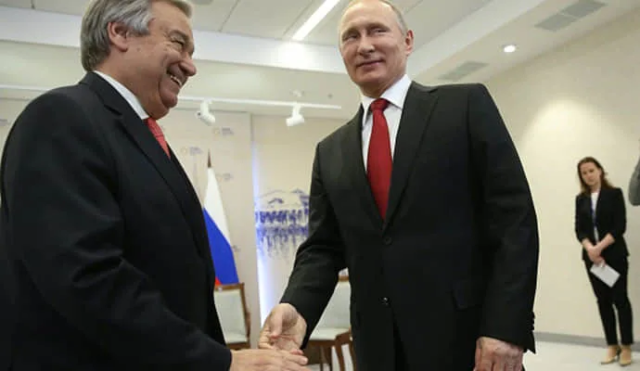
The UN is currently conducting secret negotiations with the Russian Federation to reach a deal in which the key sanctions imposed after the beginning of its large-scale invasion of Ukraine will be lifted from Vladimir Putin’s terrorist regime in exchange for reviving the Black Sea Grain Initiative.
Source: This was reported by Bild, which has obtained a secret letter from UN Secretary-General António Guterres to Russian Foreign Minister Sergey Lavrov, dated 28 August.
Quote: “A secret letter from UN Secretary-General António Guterres shows how far the UN is ready to go to restore the grain deal with the warmonger Putin,” the newspaper writes.
The letter from Guterres, which Bild calls “explosive”, proposes “four specific cornerstones of the agreement between the UN Secretariat and the Russian Federation”, which should “lead to the continuation of the Black Sea Grain Initiative”.
“All four points are important, since their implementation would meet all the requirements of Vladimir Putin’s terrorist regime and reward his missile attacks on Ukrainian civilian targets,” Bild writes.
Guterres’ proposals are as follows:
A Russian state-owned bank is to be reconnected to SWIFT
To circumvent the sanctions, the UN Secretary-General proposes to use a specially founded subsidiary of a sanctioned Russian bank, RSHB Capital SA.
This will allow the Kremlin-controlled company to “take on the role of an interface and provide technical services for payment transactions without playing the role of a bank, so it does not need a banking licence under Luxembourg law.”
“Simply put: the head of the UN wants to activate a fake bank that will bypass EU sanctions against Russian banks,” writes Bild.
Moreover, the UN has EU support for these plans.
Bild contacted the European Commission, which is responsible for the implementation of sanctions, and an EC representative confirmed that “the EU has expressed to Russia, through the UN, its openness to seeking a more permanent, constructive solution through the designated subsidiary of the Russian Agricultural Bank, which allows SWIFT payments in accordance with EU sanctions on agricultural transactions.”
Financial services provider SWIFT also indirectly confirmed this in response to Bild’s enquiry: “We are aware of the high-level discussions currently taking place around the Black Sea Grain Initiative and are closely monitoring developments.”
“So the UN and the EU are working on a ‘legal’ way to bypass the sanctions with respect to SWIFT for the sanctioned Russian Agricultural Bank,” the newspaper writes.
The UN is willing to insure Russian ships against Ukrainian attacks
Within this point, Guterres is seriously proposing to Lavrov that Russian ships should be insured against Ukrainian attacks in the Sea of Azov and the Black Sea.
He writes: “A UN-funded insurance company for Russian exports of food and fertilisers would be working with Lloyd’s within 4-6 weeks.”
As well as “cargo insurance for Russian exports of food and fertilisers”, the UN head is also offering Casco and P&I insurance.
Casco insurance is comprehensive insurance against external factors affecting ships used for transportation, while P&I is comprehensive insurance of liability for losses caused to third parties.
Guterres promises the Russian foreign minister that “the United Nations will support insurance to emphasise the importance of Russian exports to global food security and increase the number of market participants with the ultimate goal of reducing insurance costs for Russian exporters.”
Bild contacted the British ship insurer Lloyd’s, but they replied: “No comment.”
Frozen funds must be given back to Russia
Under this point, Guterres is sending Russia’s Foreign Minister Sergey Lavrov an offer to help the Putin regime recover assets in the EU that have been frozen by the sanctions.
He writes: “The United Nations may continue to help unfreeze the frozen assets of Russian fertiliser companies in the European Union.”
Like a kind of guide to sanctions evasion, the UN head tells Russia’s chief propagandist that he should “provide a list of specific accounts or assets”, and that “Russian fertiliser companies should apply to the relevant national authorities of the EU for the appropriate exemptions”.
Guterres promises that “the United Nations will work with the relevant national authorities and EU bodies to address these requests”.
Permission for Russian ships to dock in countries such as Germany to be reinstated
Finally, in the last point, Guterres proposes to “ensure effective access for Russian ships carrying food and fertilisers to EU ports through fast-track port permits”.
The UN chief notes: “The United Nations stands ready to explore further options to facilitate access for Russian ships to EU ports for agricultural trade, including simplified procedures for issuing relevant permits, particularly before departure for Russian ports.”
To this end, UN Secretary-General Guterres has “held discussions with the European Commission and selected port authorities (Germany, Belgium, Spain, the Netherlands)”.
Bild asked Germany’s Federal Foreign Office in Berlin whether it was working with the UN to facilitate Russian ships entering German ports.
Responding to a question from Bild, the EU Commission in Brussels ambiguously stated that EU sanctions provide for “targeted exemptions to allow Russian ships access to EU ports as required for the purchase, import or transport of agricultural products and food, including wheat and fertilisers”.
On 5 September, Bild asked the office of UN Secretary-General António Guterres about his outrageous letter to the Russian Foreign Minister.
There has been no response.
Bild says Russia’s leadership is now carefully studying the UN proposals and has not yet agreed to them, as the Kremlin considers them “too good to be true” and has doubts about the “technical feasibility” of the concessions offered.
Ukrainian government circles say that Guterres’ proposals are an “incredible insult” and a “reward for Russia’s aggressive behaviour” from the UN.
A senior government official stated that “under no circumstances” would the Ukrainian government resume the grain deal with Russia under these conditions, nor would it give up its “right under international law” to monitor Russian naval vessels and illegally built structures such as the Crimean Bridge in order to pursue the offensive.






